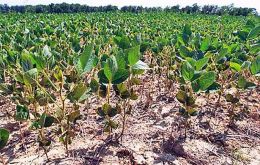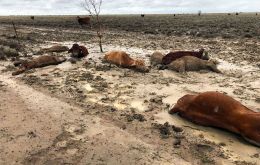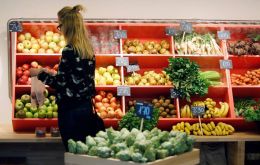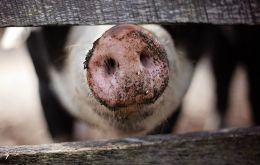MercoPress. South Atlantic News Agency
Agriculture
-
Wednesday, February 13th 2019 - 07:41 UTC
Hot and dry weather impacts on Brazil's 2018/19 soybean crop

The Brazilian 2018-19 soybean crop will fall to 115.34 million tons, as the effects of hot and dry weather in December and January are gradually taken into account, national crop agency Conab said on Tuesday.
-
Tuesday, February 12th 2019 - 09:43 UTC
Tudder, the livestock Tinder, helps farmers find the perfect breeding for their cattle

Following the example of dating and matchmaking Tinder, UK farming start-up Hectare has launched its own equivalent for livestock and called it Tudder. The app features data profiles of animals from 42,000 UK farms in an effort to help farmers find the perfect breeding partner for their cattle.
-
Tuesday, February 12th 2019 - 09:36 UTC
UK food industry blasts the “catastrophic impact” of a no-deal Brexit

The UK food industry has threatened to stop co-operating with government policy consultations, saying it is busy trying to stave off the “catastrophic impact” of a no-deal Brexit. The warning came in a letter to Environment Secretary Michael Gove from more than 30 business leaders.
-
Friday, February 8th 2019 - 08:30 UTC
Fears in Australia that hundreds of thousands of cattle could have died in record floods

Hundreds of thousands of cattle weakened from a severe drought are feared to have died in record-breaking floods in northeastern Australia, authorities said on Friday, as they stepped up efforts to feed surviving livestock.
-
Thursday, February 7th 2019 - 09:50 UTC
New Zealand' dairy industry struggling with an outbreak of Mycoplasma bovis

While experts struggle to pinpoint the original source of the Mycoplasma bovis outbreak, New Zealand Agriculture Minister Damien O'Connor says resources may be better spent on bio security systems that prevent similar outbreaks. Last May the New Zeland government announced it would try to eradicate the disease, which can cause mastitis and abortions in cows, ordering a phased culling program that's expected to cost close to US$ 700 million.
-
Monday, February 4th 2019 - 08:05 UTC
Macri on an ambitious trade and cooperation visit to India

Argentine president Mauricio Macri will be visiting India from February 17 to 19 as part of an ambitious bilateral agenda to expand trade and cooperation in a range of sectors including renewable energy, nuclear energy, space and agriculture, aviation, mining (lithium, gold and copper), pharmaceuticals and automobiles.
-
Wednesday, January 30th 2019 - 09:56 UTC
US farm lobbies want a post-Brexit UK food quality standard lowered

United States lobby groups for agriculture and pharmaceutical firms want UK standards changed to be closer to those of the US in a post-Brexit trade deal. The meat lobby wants the sale of growth hormone-fed beef, currently banned in the UK and EU, to be allowed in the UK.
-
Tuesday, January 29th 2019 - 10:19 UTC
EU quotas for farming produce post Brexit trigger controversy

The European Union on Monday adopted quotas for farming produce it will accept from third countries after Britain leaves the bloc and acknowledged this could happen before it has concluded talks with them on the subject.
-
Tuesday, January 29th 2019 - 09:31 UTC
African swine fever scare in Europe; Denmark builds a 70km fence in the border with Germany

Denmark has started building a 70km fence along its border with Germany in an effort to control the migration of wild boar. There are fears that African swine fever, which has been found in two dead wild boars in Belgium, could threaten Denmark's huge pig industry. If the disease spreads, it could jeopardize almost US$ 1.7bn in pork-product exports from Denmark.
-
Monday, January 28th 2019 - 08:32 UTC
Brazil's corn and soybeans January exports booming

Brazil is poised to export more corn than soybeans for the first time in a year this January, although sales of the oilseed remain high for the period, according to government and shipping data.